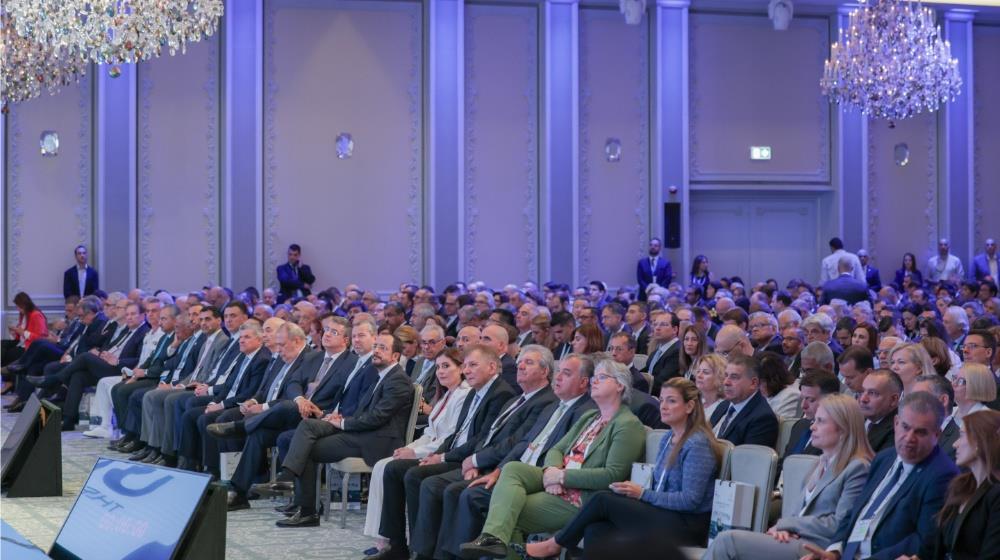More than one thousand participants from 35 countries, including heads of state, ministers, regulators, shipowners and senior industry figures, participated in the first day of Maritime Cyprus 2025 Conference that opened on Monday, 6 October, in Limassol.
Having as its main theme “Unlocking the Future of Shipping”, the conference is organised by the Shipping Deputy Ministry, the Cyprus Union of Shipowners and the Cyprus Shipping Chamber, the CSC said in a press release.
It added that a special ministerial panel, “Ministers at the Helm of Maritime Transformation,” expanded the day’s discussions to a regional level. The panel brought together Dr. Sheikh Abdullah bin Ahmed Al Khalifa, Minister of Transportation and Telecommunications of the Kingdom of Bahrain, Vasilis Kikilias, Minister of Maritime Affairs and Insular Policy of Greece, Sheikh Mohammed bin Abdullah bin Mohammed Al Thani, Minister of Transport of the State of Qatar and Marina Hadjimanolis, Shipping Deputy Minister to the President of the Republic of Cyprus.
The discussion focused on policy coordination, investment in human capital, and innovation as essential drivers of maritime transformation.
The Ministers, it added, called for stronger regional cooperation on safety, efficiency, and digitalization, agreeing that global challenges such as decarbonization and seafarer shortages can only be addressed through collective action.
The first industry panel of the day, “Navigating Disruption: Steering the Shipping Industry Through Global Turbulences,” examined how shipowners and policymakers are responding to shifting market, regulatory, and geopolitical pressures. The final discussion of the day, “Navigating Changes: Shipowners’ Insights on Industry Evolution,” brought together leading shipowners from Greece and Cyprus for a candid exchange on the future of shipping.
Adding a national policy perspective, George Papanastasiou, Minister of Energy, Commerce and Industry of Cyprus, addressed the panel to draw parallels between maritime and energy policy. According to the press release, he noted that Europe’s Green Deal, while well-intentioned, has at times advanced faster than technological capability, impacting competitiveness across industries. Moreover, he argued that Europe must retain all available energy options, including oil, gas, renewables, nuclear, and coal, to ensure affordability and energy security.
“Energy and competitiveness go hand in hand,” he said, warning that transitions made without viable alternatives risk deepening inequality. His remarks were widely welcomed by the panel as a realistic and inclusive approach to the challenges ahead, the press release concluded.
Meanwhile, a press release by the Cyprus Shipping Chamber saidthat it organised, on the opening day of the “Maritime Cyprus 2025” Conference, a high-level panel discussion titled “Navigating Disruption: Steering the Shipping Industry Through Global Turbulences.”
The discussion was moderated by Thomas A. Kazakos, Secretary General of the International Chamber of Shipping (ICS) and featured distinguished speakers from leading international shipowners’ organisations, including Themis Papadopoulos, Member of the Board and former Vice-Chairman of the ICS, Karin Orsel, President of the European Shipowners (ECSA), Ioanna Procopiou, President Designate of the Baltic & International Maritime Council (BIMCO) and Joe Kramek, President and CEO of the World Shipping Council (WSC).
The panel focused on the major challenges currently facing the global shipping industry, including the transition to decarbonisation, geopolitical uncertainties and increasing regulatory complexity. Speakers exchanged views on how shipowners and leading shipping organisations are adapting to an evolving landscape while maintaining operational efficiency and competitiveness, it says.
(Source: CNA)









